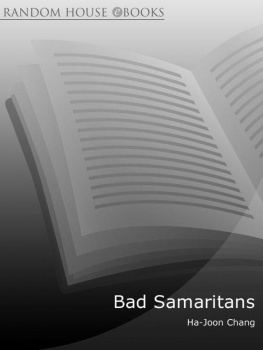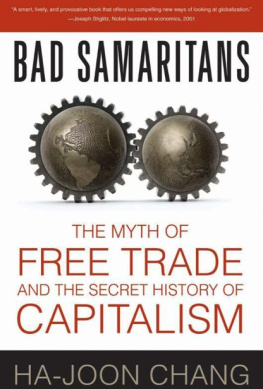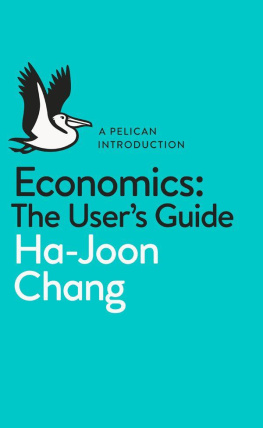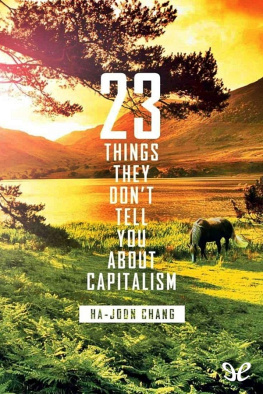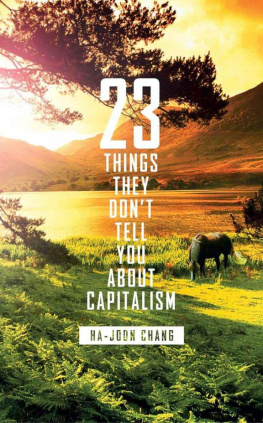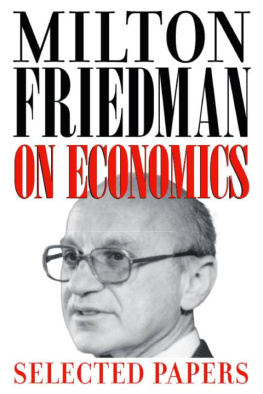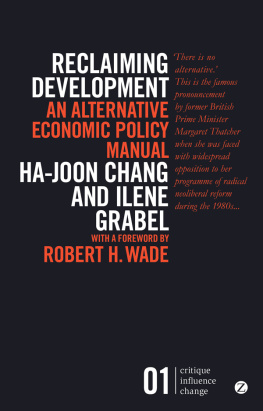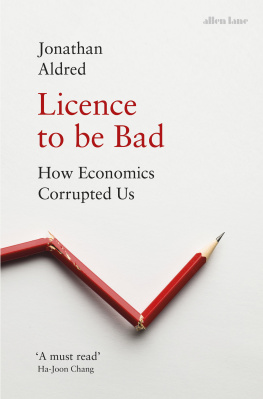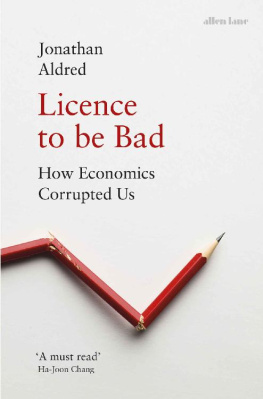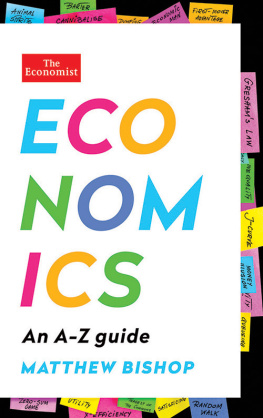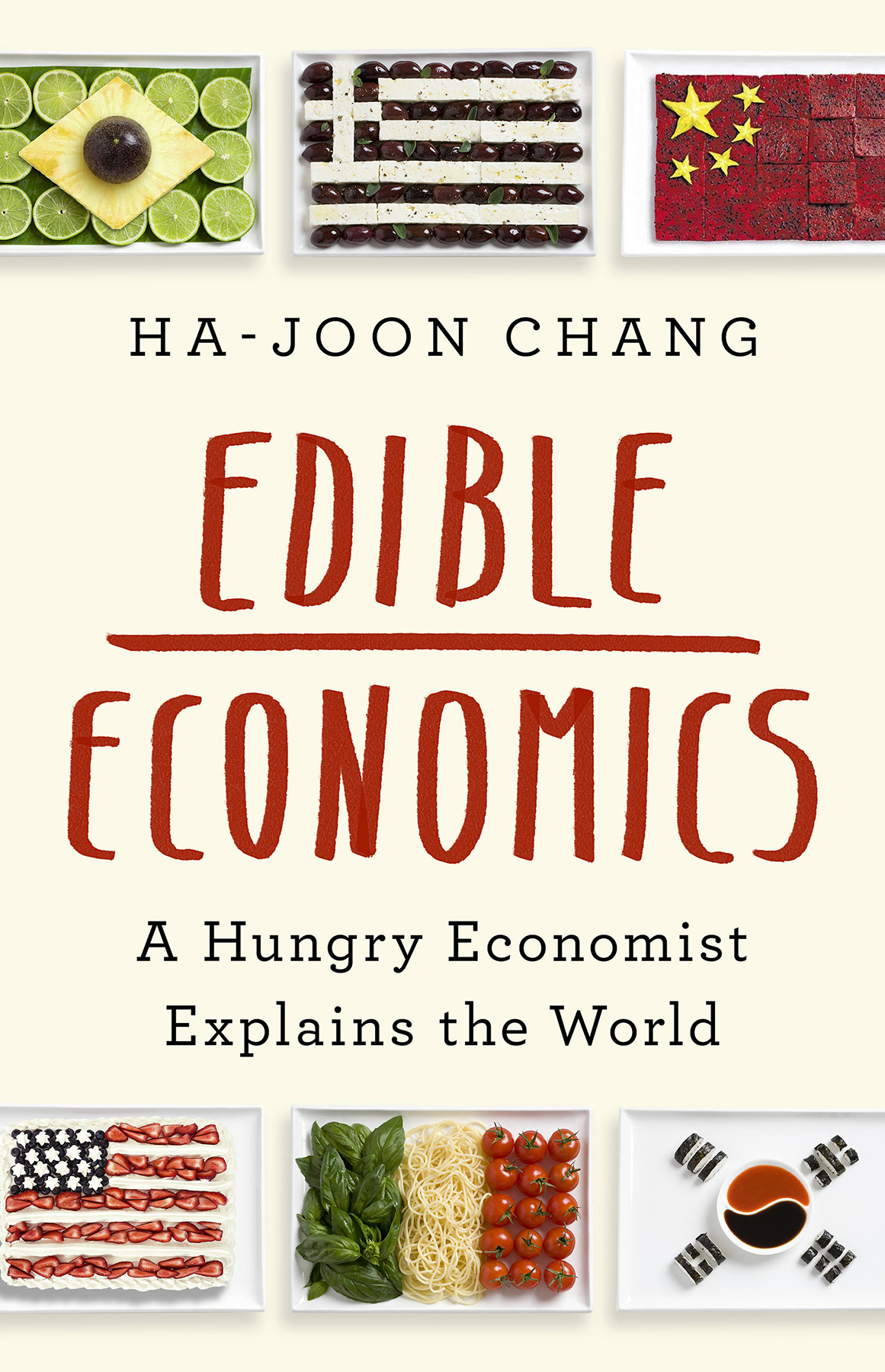Excellent. Ha-Joon Chang has been working hard at providing an alternative to neoliberalism for two decades. Now hes reached the summit of the profession.
Dan Davies, Guardian
The only book Ive ever read that made me laugh, salivate, and re-evaluate my thoughts about economicsall at the same time. A funny, profound, and appetising volume.
Brian Eno, composer
A brilliant riposte to the myth that policymakers can survive on plain neoliberal fare. Edible Economics is a moveable feast of alternative economic ideas wrapped up in witty stories about food from around the world. Chang proves yet again that he is one of the most exciting economists at work today.Owen Jones, columnist
A fascinating stew of food, history, and economics.
Timothy Spector, OBE, author of Spoon-Fed
Chang has done it again. His prose delights and nourishes in equal measure. Somehow, he manages to smuggle an urgent discussion of the relevance of economics to our daily lives into stories about food and cooking that are charming, funny, and sweet (but never sour). In taking on the economic establishment, Chang is like a teddy bear savaging a rottweiler.
David Pilling, author of The Growth Delusion
Chang blends culinary facts and economic expertise in this rollicking guide. Chang infuses the survey with food-related trivia, covers an impressive swatch of economics, and concludes with a call that readers scrutinize, think imaginatively, and be open-minded in their quest for economic knowledge.
Publishers Weekly
Copyright 2022 by Ha-Joon Chang
Cover design by Pete Garceau
Cover image Natalie Boog
Cover copyright 2023 by Hachette Book Group, Inc.
Hachette Book Group supports the right to free expression and the value of copyright. The purpose of copyright is to encourage writers and artists to produce the creative works that enrich our culture.
The scanning, uploading, and distribution of this book without permission is a theft of the authors intellectual property. If you would like permission to use material from the book (other than for review purposes), please contact permissions@hbgusa.com. Thank you for your support of the authors rights.
PublicAffairs
Hachette Book Group
1290 Avenue of the Americas, New York, NY 10104
www.publicaffairsbooks.com
@Public_Affairs
Originally published in 2022 by Allen Lane in Great Britain
First US International Paperback Edition: November 2022
First US Hardcover Edition: January 2023
Published by PublicAffairs, an imprint of Perseus Books, LLC, a subsidiary of Hachette Book Group, Inc. The PublicAffairs name and logo is a trademark of the Hachette Book Group.
The Hachette Speakers Bureau provides a wide range of authors for speaking events. To find out more, go to www.hachettespeakersbureau.com or call () - 6591 .
The publisher is not responsible for websites (or their content) that are not owned by the publisher.
Library of Congress Control Number: 2022941410
ISBNs: 9781541700543 (hardcover), 9781541700567 (e-book), 9781541703551 (international paperback)
E3-20221116-JV-NF-ORI
To Hee-Jeong, Yuna and Jin-Gyu
Manul chang-achi (pickled garlic)
(Korean my mothers recipe)
Heads of garlic, pickled in soy sauce, rice vinegar and sugar
At the dawn of time, humans suffered in chaos and ignorance (so not much has changed, then). Taking pity on them, Hwanoong, a prince of the Heavenly Kingdom, came down to Earth to visit where Korea is today and established the City of God. Within the city he elevated the human race, giving them laws as well as knowledge about agriculture, medicine and the arts.
Hwanoong was one day approached by a bear and a tiger. They had seen what he had done and, noting the way the world worked now, wanted to switch and become human. He promised them that they would each morph into human form if they went into a cave, avoided sunlight and ate only manul (garlic) and ssook for a hundred days. The animals decided to follow the instruction and entered a deep cave.
After only a few days, the tiger rebelled. This is ridiculous. I cant live on some stinky bulbs and bitter leaves. Im quitting, he said and swept out of the cave. The bear stuck with the diet and, after the one hundred days, became a beautiful woman, Woong-nyeo (literally Bear-Woman). Woong-nyeo later married Hwanoong and had a son, who became the first king of Korea, Dan-Goon.
*
Pretty much every Korean soup is made with a stock laced with garlic, whether it be meat-based or fish-based (typically using anchovy but also shrimp, dried mussel or even sea urchin). Most of those small dishes that cover tables at Korean meals ( banchan , which translates as accompaniments to rice) will have (raw, fried, or boiled) garlic irrespective of whether they contain vegetables, meat or fish, and whether raw, blanched, fried, stewed or boiled.
We Koreans dont just eat garlic. We process it. In industrial quantities. We are garlic.
South Koreans went through a staggering 7.5kg of garlic per person per year between 2010 and 2017. not even 3% of that of the Koreans. Amateurs!
OK , we dont ingest the entire 7.5kg. Lots of garlic gets left in the liquid containing the kimchi ; that liquid is usually thrown away. When you eat bulgogi and other marinated meats, tons of chopped garlic will be left floating around in the meats marinade. But even allowing for all this squandering of garlic, its a huge I mean, huge quantity.
If you have lived all your life among garlic monsters, you dont realize how much garlic you get through. That was me in late July 1986, when, aged twenty-two, I boarded a Korean Air flight to start my graduate studies in the University of Cambridge. I wasnt quite a complete stranger to air travel with, ahem, four flights under my belt, having twice flown to (and back from) Jeju, the semi-tropical volcanic island south of mainland Korea. It wasnt a lot of flight time. The flight between Seoul and Jeju lasts just under forty-five minutes, so my flying experience at that point was not quite three hours. But it wasnt the prospect of flying that made me nervous.
This was my first time ever leaving South Korea. It wasnt poverty that had kept me grounded. My father had worked as a high-ranking civil servant, and my family was comfortable, if not rich, and could have afforded a foreign holiday. However, in those days no South Korean was allowed to travel abroad for leisure purposes the government simply wouldnt issue passports for the purpose of leisure. It was the time of government-led industrialization in Korea, and the government wanted to use every dollar of export earnings to buy the machines and raw materials needed for economic development. There was no foreign currency to be wasted on frivolous things like foreign holidays.
To make matters worse, travel from Korea to Britain in those days took an unbelievably long time. Today you can fly between Seoul and London in around eleven hours. The Cold War was in full force in 1982, so capitalist planes from South Korea couldnt fly over communist China or the USSR , not to speak of North Korea. First, we flew to Anchorage, Alaska nine hours. After two hours refuelling (jet oil for the plane, Japanese udon noodle soup for me the first thing I ever tasted outside Korea), we flew for another nine hours to Europe. But not to London. Korean Air didnt then fly to London. So I spent three hours in Charles de Gaulle airport, Paris, before my final flight. Thus it took twenty-four hours to get from Gimpo Airport Seoul to Heathrow Airport London nineteen hours in the air and five hours in airports. It was a world away.


